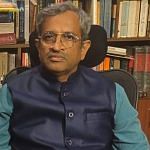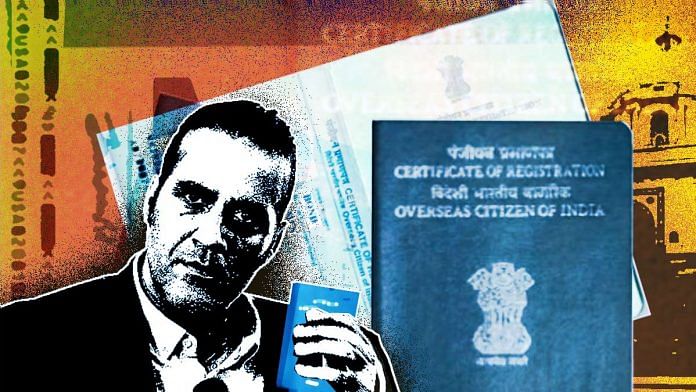The Narendra Modi government has revoked the Overseas Citizenship of India card of journalist and US-based author Aatish Taseer for not “complying with basic requirement and hiding information about his father’s Pakistani origin”. Unlike the OCI card, the new Passport rules don’t require an applicant to disclose the father’s name.
ThePrint asks: Aatish Taseer: Why is father’s name an issue for OCI if it’s not needed in Indian passports?
A strictly legal view should be taken for Aatish Taseer’s case, not a political one
 Kanwal Sibal
Kanwal Sibal
Former foreign secretary and executive council member at VIF
Aatish Taseer’s case is a peculiar one. His father was a Pakistani and his mother is an Indian. He is himself not an Indian passport holder.
Whether he is entitled to an OCI card has become a complicated issue. If his father was not a Pakistani, he could not be denied a card. His situation is a bit sui generis and hence the government’s decision. Some may see a sort of political vendetta in this for his anti-BJP and anti-Modi commentaries. He has certainly not endeared himself by his attacks on Modi, but such cases should not be decided on the basis of politics. A strictly legal view should be taken.
The Modi government’s case is that he obtained the OCI card by suppressing information about his father. If this is true, then he has been rightfully deprived of his OCI card. If not, and if despite providing that information, his case falls in a grey area because of his Pakistani father’s nationality, he could then seek legal redress. The problem for him would be that on a foreign passport that he holds he can be denied a visa, but possessing an OCI card eliminates the need for a visa. He has options depending on facts and legal provisions.
India doesn’t recognise dual citizenship. OCI card is a little bit of legal jugglery in this regard
 Sanjay Hegde
Sanjay Hegde
Senior Advocate, Supreme Court
Aatish Taseer and I frequently interacted on Twitter until my account was suspended. Considering the legalities, what I’ll say may not necessarily comfort him. India does not recognise dual citizenship. The Overseas Citizenship of India card is a little bit of legal jugglery in this regard.
The details about one’s parentage are a huge factor while deciding whether an applicant should be issued an Indian passport.
In the case of the progeny of single Indian women, the courts decided to waive off the requirement of mentioning the father’s name. The OCI card does not offer full citizenship. This provision only offers certain benefits with respect to permitting entry and stay in India. But it excludes certain categories from the benefits of having the overseas citizenship. To that extent, legally speaking, it may be justified for Indian authorities to insist on the disclosure of both parents’ details for the OCI card.
In Aatish’s case, he has written an entire book, which has a historical context, and fully details his almost non-existent relationship with his late father Salman Taseer. While the world is well aware of this, it is not yet known if this information was disclosed in his application form of the OCI card. It is between these cracks in the law that the fate of precarious cases like his are decided.
The real real question is how do we define citizenship in a xenophobic India
 Ira Raja
Ira Raja
Associate Professor, Delhi University
Indian Passport rules now allow birth certificates and passports to be issued with only the name of the mother on the document. So, in that context, this fuss over Aatish Taseer’s father’s name seems misplaced and you wonder if there is some other agenda for going after him.
I am not sure about what the law says in the case of Persons of Indian Origin. If there is a provision in the law that prevents PIO status being given to individuals who has one Pakistani parent, then the Modi government has an alibi: it can say it is simply following the law.
The question then is how do we define citizenship. It is increasingly being defined — and not just in India — in very narrow, exclusive, and xenophobic ways. On the one hand, you talk of globalisation and the opening up of borders, but on the other, you have this kind of policing of borders.
It is also hard to ignore the fact that Aatish Taseer offered a very critical analysis of the current government a few months ago. If you are going to do that, then you should be prepared for this.
Also read: Stop targetting Aatish Taseer, Committee to Protect Journalists tells Modi govt
It’s not about father’s name, OCI is given to people who have no Bangladeshi or Pakistani connection
 Sushant Sareen
Sushant Sareen
Senior Fellow, ORF
I don’t think the issue is about the disclosure of one’s father’s details. The condition for giving an Overseas Citizenship of India card to anybody is based on the condition of exclusion that the applicant or even their parents are not of Bangladeshi or Pakistani descent.
In the case of Aatish Taseer, it seems like he has been targeted for writing against the Narendra Modi government. But if the form which he filled has fallen foul of the criteria for receiving an OCI card, then the Modi government is well within its right to make this move.
The fact that somebody is a dissenter doesn’t make him or her entitled to not comply with the rules of any provision. It can’t become a claim for something that’s not allowed under the law.
The Modi government believes that it has played it by the book. Taseer claimed that he received the letter from the government 20 days later, and was left with only one day to submit his response. If this is found to be true, then he can legally challenge the government. On the other hand, the Modi government can take the position that it gave Taseer adequate time. The claim that he was informed after 20 days does not necessarily mean that it’s the government’s fault. That fault lies with him. However, there is no way that either you or I can check the veracity of the allegations made.
Modi govt greedy for approval from Western press and Taseer’s article pushed them over the edge
 Rohit Chopra
Rohit Chopra
Founder, India Explained
The father’s name should not in any way matter for an OCI card or any other document if the mother is the guardian and her name has been provided. In Aatish Taseer’s case, the OCI is just a convenient pretext for punishing him for being critical of Modi in the international press. For all their talk of being sons of the soil, Hindu nationalists are remarkably greedy for approval from the Western media, and Taseer’s article in Time pushed them over the edge.
Requiring details about the father in the OCI application, though, also shows us the tension between legal and bureaucratic reform and patriarchal attitudes. Effective social reforms require a change as much as legal reforms. The idea that it is the father who gives a child their identity continues to hold sway in Indian society, or at least across large sections of it. Combine that with the resurgence of anti-Pakistani sentiment and ugly jingoism since the ascendancy of the BJP to power in 2014 and presto! – you get the toxic rationale that the MEA gave for revoking Aatish Taseer’s OCI status.
The fact that Indian passports no longer require the father’s name is a positive and progressive step. The larger challenge of addressing the incendiary combination of patriarchy and a mean-spirited majoritarian nationalism still persists. Until that is tackled, the Indian state will continue to have another punitive tool to discipline and punish its citizens, overseas or not.
If passports can be issued with mother’s name, rules should be changed for OCI card also
 Ranjana Kumari
Ranjana Kumari
Director, CSR
The control over children has to be understood within the patriarchal framework in India. Progeny is important since property has to be transferred to boys, leading to a situation where we become a society where a girl child is not even allowed to be born. The other consequence is that mothers have absolutely no authority over the child. However, if you look at the science of it, the mother has the first right over the child. This is not to say that the father doesn’t matter.
This is a very archaic and is no longer socially acceptable. With changing times, relationships are also changing. This argument led to the decision that no official form requires the father’s details. Moreover, it doesn’t require even the mother’s details, but only the single parents’ details.
In Aatish Taseer’s case, the father’s name shouldn’t be necessary at all. Passports can be issued with the mother’s name only, so why shouldn’t the rules be changed accordingly for the Overseas Citizenship of India card as well?
Also read: Aatish Taseer’s father Salman Taseer was a proud Pakistani and defender of 2-nation theory
By Taran Deol, journalist at ThePrint




The question asked in OCI Application is as under. And AAtish Taseer had hide the information of his father, paternal grand parents and great-grandparents.
Whether either of parents or grandparents or great-grandparents of the applicant had ever been citizen of Pakistan or Bangladesh at any time?
So when Aatish uses his power to severally defame a PM of the country he is also insulting and patronizing atleast quarter billion people who voted for him. Modi isn’t a dictator or from the Military, but elected fair and square. Most of his supporters not not blood thirsty religious fanatics. There are many other reasons why so many people supported him. Aatish feels entitled and have this typical westernized patronizing behavior. His article in Times was not a critical piece of argument against the Modi government which is legitimate journalism. It read more like a vitriolic blog opinion piece rather than journalism. So when you use your influence in your axis of power for extreme measures, prepared for the same in return. I do not know if OCI cancellation was political. But if it so, the ruling party is also using their axis of power like you did – opinion vs. opinion. Fair play it is!
Bwahahahahaha!
Good Rama!
Hail Shankara, eh?
Librandus feel pride in defaming India world wide. and they think its their right to defame India but they cry when they are nailed for violation of law.
A government that has raised perception management to an art form should recognise how this decision will be viewed globally.
You are beyond repair; a person who punches above his weight. Do you even know the rules of OCI? Yes, if mother’s name is the only requirement then OCI rules should also be changed. But till rules change, why should this person be given OCI? Take a break instead of crawling all over THE PRINT.
PS: When the US government asks your social media details, then the slave in you will stand in the queue with folded hands.
To be perfectly honest, RR, mujhe Overseas “ Citizens “ of India, yeh terminology hi samajh mein nahin aati. This should mean conventional NRIs, Indian citizens who reside abroad, like guest workers in West Asia. 2. Lines are getting blurred, as seen in British citizens of Indian origin canvassing for the Conservatives because the Labour Party is taking a stand inimical to India’s. Pitfalls lie ahead.
You are taking a very simplistic view ashok. Honestly you are still sticking to the norms of 20th century politics, governance and communication. Your arguments are valid only if supported by critical research or opinion by experts in the field.
(1) OCI means any Indian who has taken up foreign citizenship. India does not allow dual citizenship so they had launched this PIO scheme earlier which required the foreigner of Indian origin to report to nearest police station every 6 months of stay. Then OCI was introduced as a more liberal life-long visa format. Modi government simplified this by merging the two; (2) Many OCI holders are young IT workers and skilled migrants who, though they have taken foreign citizenship, have a strong attachment to India, and therefore support India’s interests abroad. Is there anything wrong with that?
To make it more simple for you, I suggest you wear your liberal cap. Just like you wouldn’t object to Sonia being the PM of India because she is completely integrated because of her marriage etc. why should you object to NRIs, OCIs and PIOs to support Indian interests when based abroad. These are lobbies that have all the legitimate right to take the route they feel appropriate.
I agree with you I have an OCI card and this is a privilege and not a right .This man taseer used his privilege to attack the prim minster without any real facts in his article. Being an OCI,s it gives us a chance to support Indian intrests